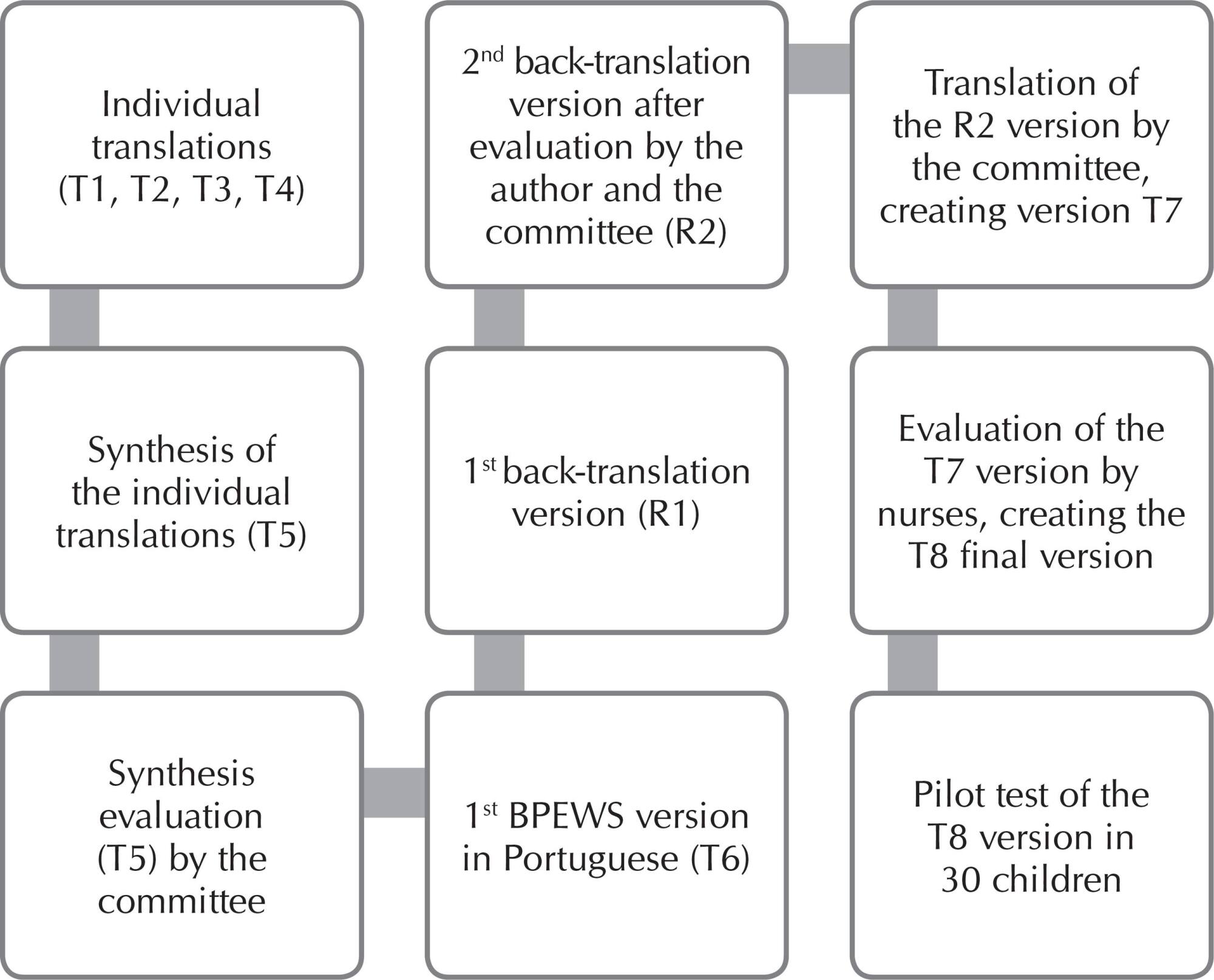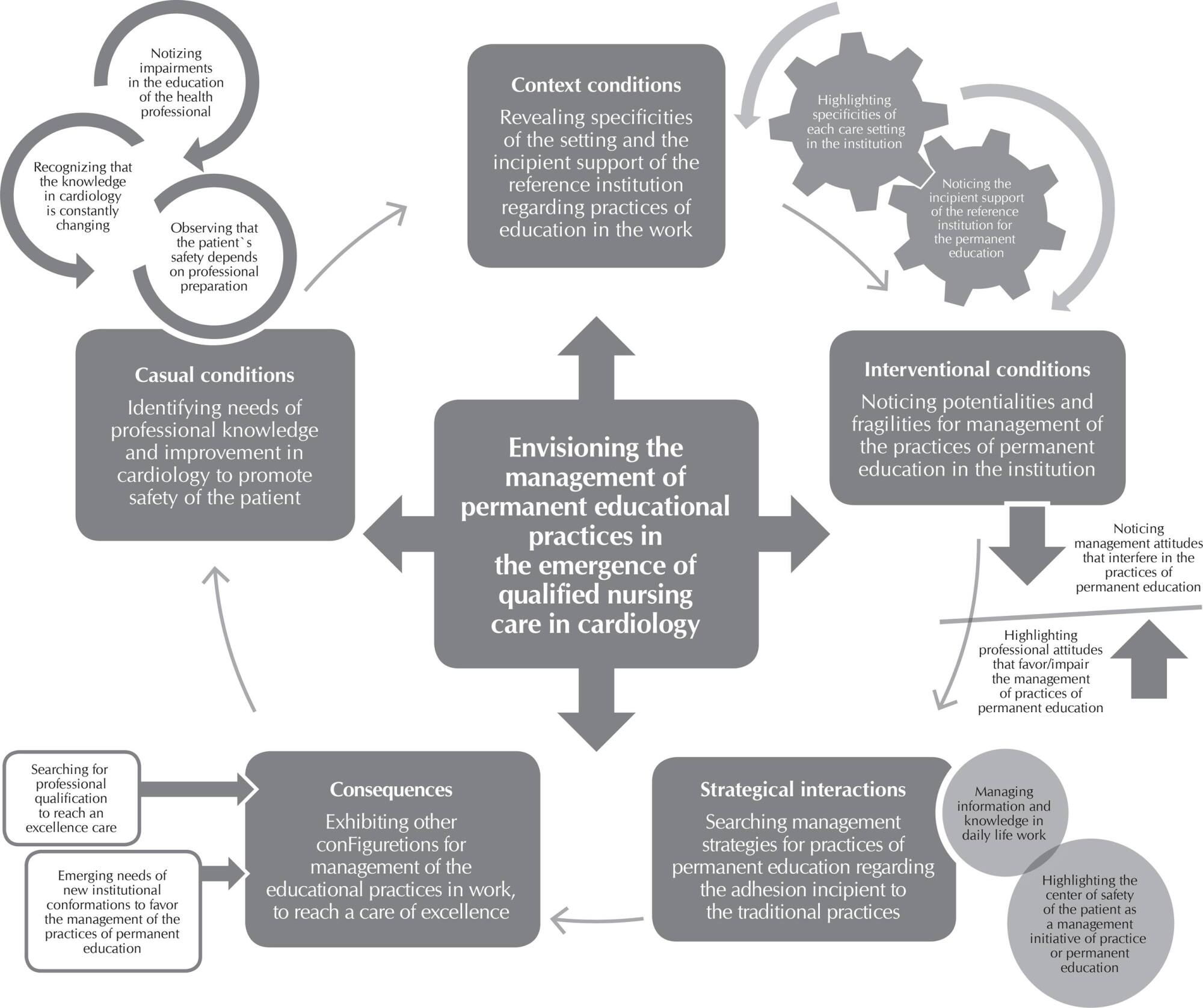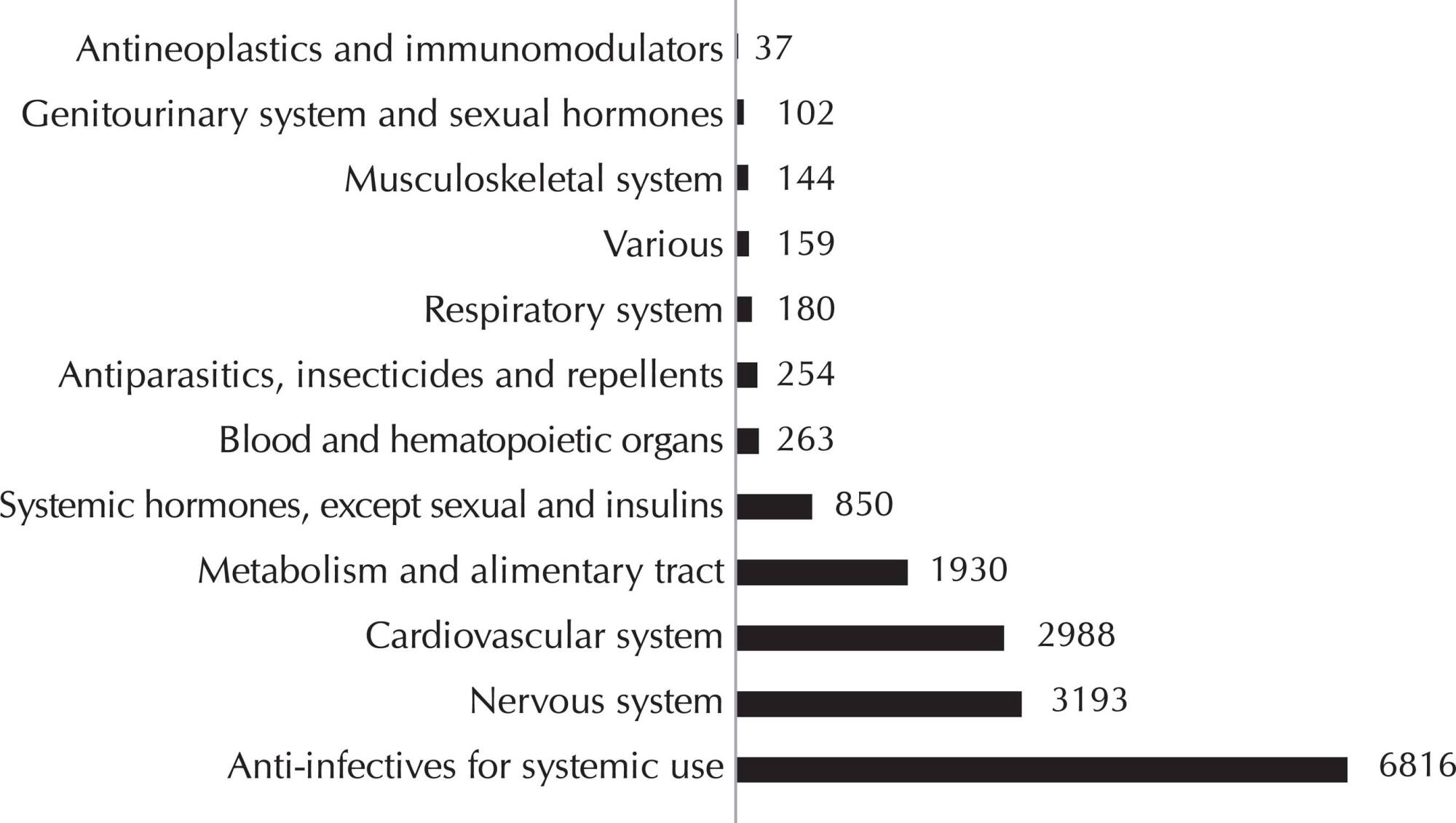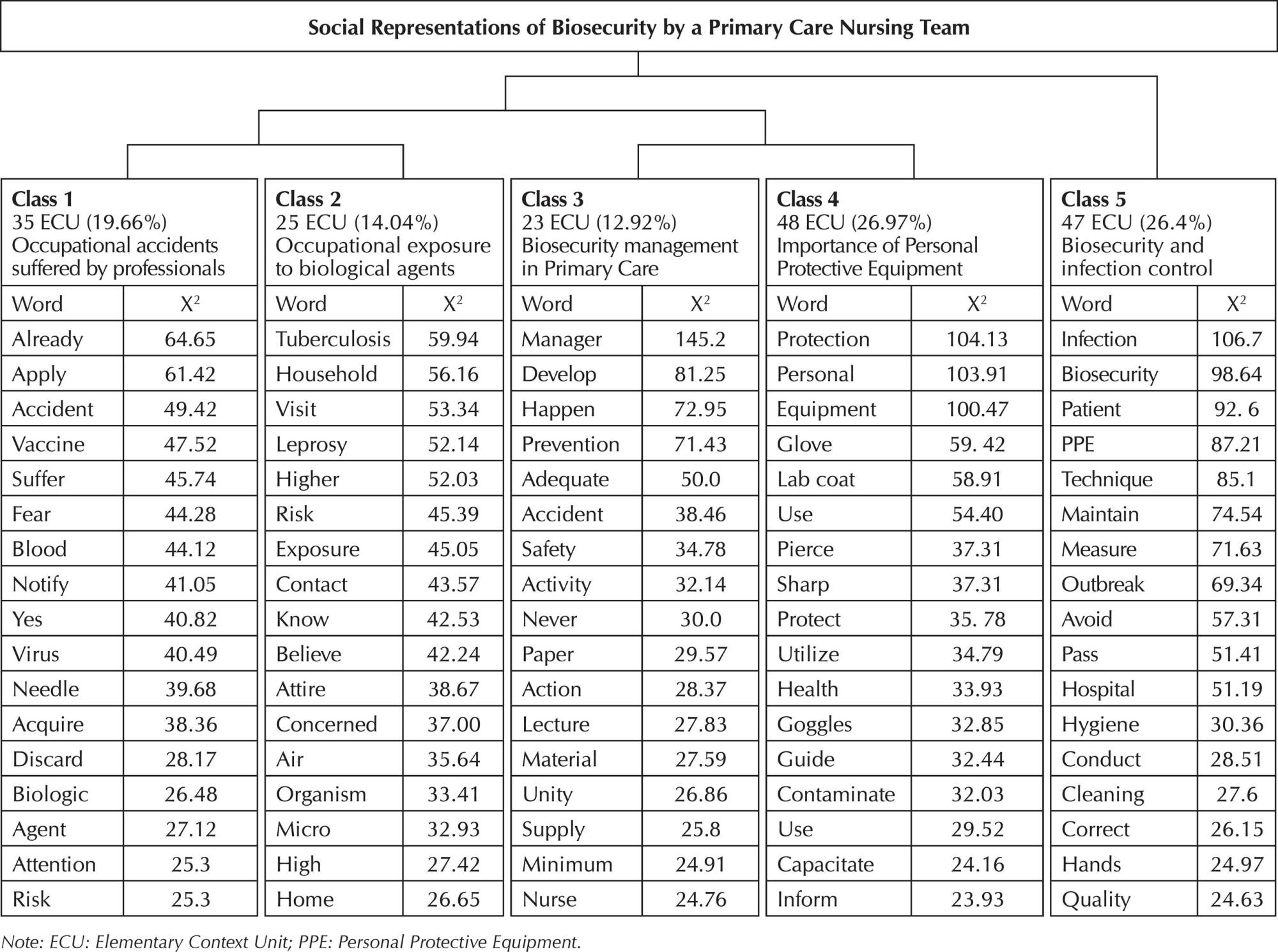-
RESEARCH
Occupational health nurses: interdisciplinary experience in occupational health
Revista Brasileira de Enfermagem. 2016;69(5):897-905
01-01-2016
Abstract
RESEARCHOccupational health nurses: interdisciplinary experience in occupational health
Revista Brasileira de Enfermagem. 2016;69(5):897-905
01-01-2016DOI 10.1590/0034-7167-2015-0113
Views0ABSTRACT
Objective:
to analyze the relationship of occupational health nurses with the other members of the Specialized Service in Safety Engineering and Occupational Medicine (SESMT) and characterize joint actions of these professionals in occupational health.
Method:
qualitative, exploratory, and descriptive study with 34 professionals of seven companies from the South Macroregion of the state of Rio Grande do Sul. Interviews and observations were conducted for content analysis of Bardin.
Results:
the SESMTs are multidisciplinary and intersectoral workers. Nurses have working relations of an interpersonal, technical/legal, and management of logistics/organizational nature, influenced by the technical division of work and by the division in the work environment of the staff, which distances areas, generates conflicts, and fragments the actions of the service.
Conclusion:
SESMT faces challenges to develop a work befitting their legal objectives, once staff and companies need to understand the importance of interdisciplinarity for the success of actions on the workers’ health and safety.
Keywords:InterrelationshipOccupational Health NursingOccupational Health ServicesWorkWorkers' HealthSee more -
RESEARCH
Translation and adaptation of a pediatric early warning score
Revista Brasileira de Enfermagem. 2016;69(5):888-896
01-01-2016
Abstract
RESEARCHTranslation and adaptation of a pediatric early warning score
Revista Brasileira de Enfermagem. 2016;69(5):888-896
01-01-2016DOI 10.1590/0034-7167-2015-0096
Views0See moreABSTRACT
Objective:
to translate and adapt the BPEWS for the Portuguese language, with the purpose of verifying its applicability in the Brazilian context studied.
Method:
methodological study guided by international and nationally accepted recommendations for translation and adaptation of health measurement instruments. Stages of conceptual, item, semantic, operational and pre-test equivalence are described for obtaining the BPEWS Portuguese version to be used in Brazil.
Results:
the BPEWS version translated and adapted for Brazilian Portuguese (BPEWS-Br) identified, in the pilot study, that 26.6% of children were presenting warning signs for clinical deterioration.
Conclusion:
the BPEWS-Br seems to be applicable for the context studied, and its use might help nurses in the recognition and documentation of warning signs for clinical deterioration in hospitalized Brazilian children.

-
RESEARCH
Validation of the Nursing Activities Score in Portuguese intensive care units
Revista Brasileira de Enfermagem. 2016;69(5):881-887
01-01-2016
Abstract
RESEARCHValidation of the Nursing Activities Score in Portuguese intensive care units
Revista Brasileira de Enfermagem. 2016;69(5):881-887
01-01-2016DOI 10.1590/0034-7167-2016-0147
Views0See moreABSTRACT
Objective:
to describe the process of adaptation and validation of the Nursing Activities Score to the Portuguese context.
Method:
this was a pilot study of adaptation and validation of the Nursing Activities Score with a sample consisting of 67 patients hospitalized in the intensive care units of three Portuguese hospitals. The construct validity was assessed through factor analysis procedures and the internal consistency of the items was measured through the Cronbach’s alpha coefficient.
Results:
a mean workload value of 63.04% (SD = 14.25; Median = 61.30) was obtained. Psychometric data revealed a Cronbach’s alpha of 0.71 in the total scale, indicating an acceptable accuracy. Confirmatory factor analysis suggested an appropriate adjustment between the model and the data (χ2(199) = 214.5, p = 0.214; CFI = 0.95; RMSA = 0.035).
Conclusion:
in the present study, the Portuguese version of the Nursing Activities Score was found to be a valid instrument, enabling a safe assessment of the workload of nurses.
-
RESEARCH
Managing educational practices for qualified nursing care in cardiology
Revista Brasileira de Enfermagem. 2016;69(5):872-880
01-01-2016
Abstract
RESEARCHManaging educational practices for qualified nursing care in cardiology
Revista Brasileira de Enfermagem. 2016;69(5):872-880
01-01-2016DOI 10.1590/0034-7167-2015-0032
Views0See moreABSTRACT
Objective:
to understand significances attributed by nurses who manage nursing care to the individual affected by cardiovascular disease to relations, interactions and associations of the educational practices in a cardiovascular reference hospital. To elaborate a theoretical explanatory model based on significances attributed in the light of the complex thinking.
Method:
qualitative study, which used Theory Based on Data (TBD) as methodological reference. Twenty-two professionals of nursing participated in the study.
Results:
the results indicate need of professional qualification to ensure the safety of patients, institutional support for the realization of educational practices, attitude of openness and availability of dialogue of the health professionals and other institutional conformations for the workers’ development.
Conclusion:
the study presents a new space for the nurse’s action that can be used to qualify and optimize the nursing practice, as it provides visibility to management and care in health institutions.

-
RESEARCH
Clinical validation of nursing diagnosis “Willingness for improved infant development”
Revista Brasileira de Enfermagem. 2016;69(5):855-863
01-01-2016
Abstract
RESEARCHClinical validation of nursing diagnosis “Willingness for improved infant development”
Revista Brasileira de Enfermagem. 2016;69(5):855-863
01-01-2016DOI 10.1590/0034-7167-2015-0131
Views0See moreABSTRACT
Objective:
to conduct the clinical validation of nursing diagnosis “Willingness for improved infant development”.
Method:
a cross-sectional study, conducted in a Centro de Saúde da Família (Family Health Care center), with 45 healthy breastfed infants. The instrument for collecting the data was prepared based on the literature and validated by nurses. It contained the following variables: sociodemographic, gestational, and obstetrical variables; breastfed infant’s nutritional profile; evaluation of the defining characteristics of the proposed nursing diagnosis.
Results:
all the defining characteristics were found to have high sensitivity values (>90%), positive predictive values (>65%), negative predictive values (>66%); however, low specificity values (<32%). In this study, the defining characteristics we found to have estimates (>0.50) within the ROC curve, which provides good sensitivity and specificity.
Conclusion:
this study verified the structural elements of the proposed nursing diagnosis to be relevant in the clinical context, which justifies the need for its being employed with children, taking into account its contribution to improving nursing care.
-
RESEARCH
Oral drugs at a hospital unit: adequacy for use via enteral feeding tubes
Revista Brasileira de Enfermagem. 2016;69(5):847-854
01-01-2016
Abstract
RESEARCHOral drugs at a hospital unit: adequacy for use via enteral feeding tubes
Revista Brasileira de Enfermagem. 2016;69(5):847-854
01-01-2016DOI 10.1590/0034-7167-2015-0081
Views0See moreABSTRACT
Objective:
to describe the profile of standardized oral drugs at a hospital unit and assess their adequacy for use via enteral feeding tubes, according to recommendations from the literature.
Method:
descriptive study, with data on drugs collected from the Pharmacy Service Dispensing System. Specific recommendations for the use of these drugs via enteral feeding tubes were found after searches in literary databases, books, manuals, guidelines and package insert collections.
Results:
among the 236 dispensed oral drugs, 86% were in solid form; of those, 32 were “non-crushable”, with the liquid form available at the institution. Twenty-eight drugs with potential interactions with enteral nutrition were identified. Sixty percent of those presented specific recommendations on their administration via enteral feeding tube.
Conclusion:
the joint participation of multidisciplinary nutritional therapy and care teams and the implementation of programs for continuous training are suggested strategies for the prevention of potential problems in the administration of drugs in the hospital setting.

-
RESEARCH
Nurses’ performance on indigenous and African-Brazilian health care practices
Revista Brasileira de Enfermagem. 2016;69(5):840-846
01-01-2016
Abstract
RESEARCHNurses’ performance on indigenous and African-Brazilian health care practices
Revista Brasileira de Enfermagem. 2016;69(5):840-846
01-01-2016DOI 10.1590/0034-7167.2016690504
Views0See moreABSTRACT
Objective:
to analyze the performance of nurses from the Estratégia Saúde da Família (Family Health Strategy) on health care practices rooted in African and Indigenous cultures.
Methods:
Thematic Oral History was used and interviews were conducted with seven participants, who worked with Primary Health Care in Northeastern Brazil. The analysis was based on Leininger’s Theory of Cultural Care and the intercultural concept of human rights, among others.
Results:
nurses are unaware of the religious and historical context of the ethnic groups cared for and do not appreciate their self-care practices in areas with a predominance of African and indigenous cultures. These practices coexist with the hegemonic biomedical model.
Conclusion:
the debate on cultural competence in the context of professional qualification and exercise is required, aiming to promote the nursing work in the perspective of diversity and comprehensiveness of health care.
-
Nurse-midwives reconfiguring care in the scope of labor and births in COVID-19 times
Revista Brasileira de Enfermagem. 2021;74:e20200863
04-14-2021
Abstract
Nurse-midwives reconfiguring care in the scope of labor and births in COVID-19 times
Revista Brasileira de Enfermagem. 2021;74:e20200863
04-14-2021DOI 10.1590/0034-7167-2020-0863
Views0See moreABSTRACT
Objectives:
to analyze how the nurse-midwives of maternity wards that were fields of practice for an improvement course in obstetrics have reorganized care in the context of labor and birth amidst the COVID-19 pandemic.
Methods:
this is a descriptive, exploratory and qualitative study carried out with nine nurse-midwives who are preceptors and collaborators in maternity wards that were fields of practice for an improvement course, between February and April 2020, through a semi-structured interview through WhatsApp®. Content analysis was used to treat the information.
Results:
the pandemic brought the need to reorganize work, with a focus on service training and maintenance of good practices in labor and birth, whose movement was intensely experienced, interfering in nurse-midwives’ mental health.
Conclusion:
nurse-midwives have faced the pandemic with concerns about maintaining safe care, focused on practices based on updated scientific evidence.
-
EDITORIAL
The era of precision medicine and its impact on nursing: paradigm shifts?
Revista Brasileira de Enfermagem. 2021;74(5):e740501
07-28-2021
Abstract
EDITORIALThe era of precision medicine and its impact on nursing: paradigm shifts?
Revista Brasileira de Enfermagem. 2021;74(5):e740501
07-28-2021DOI 10.1590/0034-7167.2021740501
Views0INTRODUCTIONThe large investment and development of research in genomics and molecular biology in the last two decades, especially after the conclusion of the Human Genome Project (HGP), has generated many expectations regarding its impact on the transformation from the conventional medicine paradigm to the precision medicine paradigm(–). The term precision medicine (PM) was used for […]See more -
ORIGINAL ARTICLE
Knowledge and health promotion practice of Family Health Strategy nurses
Revista Brasileira de Enfermagem. 2020;73(5):e20190362
07-06-2020
Abstract
ORIGINAL ARTICLEKnowledge and health promotion practice of Family Health Strategy nurses
Revista Brasileira de Enfermagem. 2020;73(5):e20190362
07-06-2020DOI 10.1590/0034-7167-2019-0362
Views0See moreABSTRACT
Objectives:
to analyze the knowledge and health promotion practice carried out by Family Health Strategy nurses.
Methods:
a descriptive study and qualitative approach. The study was conducted with 18 Family Health Strategy nurses from the city of São Carlos. Data were collected through semi-structured interviews and analyzed through thematic analysis. The study was approved by the Research Ethics Committee.
Results:
the data revealed that nurses had difficulties to conceptualize health promotion, and it is common to describe the definition of disease prevention. Nurses also reported developing group activities for health promotion; however, individual actions and consultations were still predominant.
Final Considerations:
it is necessary to develop sustainable strategies for collective health-promoting activities, in addition to strengthening multidisciplinary work and Continuing Education actions.

-
Quality of life and falls in elderly people: a mixed methods study
Revista Brasileira de Enfermagem. 2021;74:e20200400
05-21-2021
Abstract
Quality of life and falls in elderly people: a mixed methods study
Revista Brasileira de Enfermagem. 2021;74:e20200400
05-21-2021DOI 10.1590/0034-7167-2020-0400
Views0ABSTRACT
Objective:
to assess elderly people’s quality of life, understanding the social representations of falls.
Methods:
a convergent mixed methods research carried out at homes, with a sample of 134 elderly people. A structured questionnaire was used, covering sociodemographic variables and factors that indicated frailty and risk of falling. For quality of life assessment, Medical Outcomes Study Short-Form 36 and Theory of Social Representations, Abric’s structural approach were used, with data treated by dictionary of equivalent terms, processed in Evoc 2000, converging analytically according to Neuman.
Results:
quality of life impairment was identified in terms of physical, emotional and functional capacity. The elements of the possible central nucleus were fall, fear, and bruised-broken-bone.
Final considerations:
quality of life impairment can contribute to increase the number of falls, which has been shown to be an event present in elderly people’s lives through evocations. Understanding elderly people’s individual demands allows planning actions.
Keywords:Accident PreventionAccidental FallsCommunity Health NursingHealth Services for the AgedQuality of LifeSee more
-
REFLECTION
In defense of the Unified Health System in the context of SARS-CoV-2 pandemic
Revista Brasileira de Enfermagem. 2020;73:e20200247
07-10-2020
Abstract
REFLECTIONIn defense of the Unified Health System in the context of SARS-CoV-2 pandemic
Revista Brasileira de Enfermagem. 2020;73:e20200247
07-10-2020DOI 10.1590/0034-7167-2020-0247
Views0See moreABSTRACT
Objective:
To discuss the political and structural conditions for establishing the Unified Health System (UHS – Sistema Único de Saúde, SUS) in coping with the SARS-CoV-2 pandemic.
Methods:
Theoretical-reflection study.
Results:
At the first moment named “The global and the local in facing the SARS-CoV-2 pandemic” is presented the health crisis that took place worldwide and the government actions to combat COVID-19. A second moment named “Between dismantling actions and resistance, the UHS is the best way to face the SARS-CoV-2 pandemic”, reflects on the neoliberal attacks on the health system and how it resists, remaining the main pandemic response strategy.
Conclusion:
The strengthening of democracy and the defense of the UHS are the way out of the crisis. It is believed that this reflection generates – in everyone who deals with caretaking – the political action, the ethical attitude, the desire for valorization and the spirit of struggle in defense of the UHS and human life.
-
Historicity of nursing graduate studies in Brazil: an analysis of the Sociology of the Professions
Revista Brasileira de Enfermagem. 2021;74(6):e20190827
08-20-2021
Abstract
Historicity of nursing graduate studies in Brazil: an analysis of the Sociology of the Professions
Revista Brasileira de Enfermagem. 2021;74(6):e20190827
08-20-2021DOI 10.1590/0034-7167-2019-0827
Views0See moreABSTRACT
Objectives:
to analyze the scientific productions about the history of graduate studies in Brazilian nursing in the light of Eliot Freidson’s Sociology of the Professions.
Methods:
an integrative review, carried out in the databases indexed in Virtual Health Library. The Preferred Reporting Items for Systematic Reviews and Meta-Analyses recommendations were followed. Thematic content analysis and Eliot Freidson’s concepts were adopted.
Results:
two categories emerged: “Institutionalization of graduate courses in Brazilian nursing”, highlighting the historical process of professionalization in nursing through transition from empirical to professional care, subsidized by the monopoly of the construction of one’s own knowledge; “The scientific production of graduate nursing in Brazil”, showing the strengthening of a new generation of nurse researchers, given the greater scientificity in teaching due to implementation of graduate studies.
Final Considerations:
the analyzes present the historicity of graduate studies’ institutionalization, supporting the understanding of professionalization outlines of Brazilian nursing.

-
ORIGINAL ARTICLE
Binge drinking and overweight in brazilian adults – CUME Project
Revista Brasileira de Enfermagem. 2020;73:e20190316
06-01-2020
Abstract
ORIGINAL ARTICLEBinge drinking and overweight in brazilian adults – CUME Project
Revista Brasileira de Enfermagem. 2020;73:e20190316
06-01-2020DOI 10.1590/0034-7167-2019-0316
Views0See moreABSTRACT
Objective:
To verify the association between heavy episodic alcohol consumption [binge drinking (BD)] and overweight in 2,909 adults from the Cohort of Universities of Minas Gerais (CUME Project) baseline, Brazil.
Method:
Cross-sectional study in which sociodemographic, anthropometric (BMI ≥ 25 kg/m2 = overweight) and dietary intake data were collected. This study evaluated the occurrence and monthly frequency of BD (≥ 4 drinks at one time for women; ≥ 5 drinks at one time for men, in the last 30 days).
Results:
The prevalence of BD and overweight were 41.3% and 40.8%, respectively. BD increased the prevalence of overweight by 19%, and, BD exposure by ≥ 5 days / month increased it by 31%.
Conclusion:
BD on a single or multiple occasion during the month was associated with a higher prevalence of overweight. Therefore, such a lifestyle should be considered in weight gain prevention strategies.
-
REVIEW
Allocation of resources for health care in COVID-19 pandemic times: integrative review
Revista Brasileira de Enfermagem. 2020;73:e20200244
09-18-2020
Abstract
REVIEWAllocation of resources for health care in COVID-19 pandemic times: integrative review
Revista Brasileira de Enfermagem. 2020;73:e20200244
09-18-2020DOI 10.1590/0034-7167-2020-0244
Views0See moreABSTRACT
Objective:
To analyze information on resource allocation in the context of the COVID-19 pandemic, published in indexed scientific journals, from December 2019 to March 2020.
Methods:
This is an integrative literature review, which took place in March 2020. All databases were investigated and studies were found only in MEDLINE. After applying the established criteria, six articles were selected.
Results:
It was evident that the allocation of resources is carried out as the demands emerge. The fragility in presenting scientific-methodological evidence that can guide decision makers for assertive allocation of available resources is highlighted. The results showed that studies on this subject are incipient and need to be expanded.
Final considerations:
The need for health organizations and area authorities to be better prepared for the proper use of available resources, with allocation based on scientific evidence and maximization of resources is indicated.

Search
Search in:
Nuvem de Tags
Aged (144) Atenção Primária à Saúde (239) COVID-19 (104) Cuidados de Enfermagem (269) Educação em Enfermagem (151) Educação em Saúde (139) Enfermagem (930) Estudos de Validação (131) Health Education (144) Idoso (208) Mental Health (149) Nursing (987) Nursing Care (306) Patient Safety (151) Primary Health Care (284) Qualidade de Vida (104) Quality of Life (106) Saúde Mental (145) Segurança do Paciente (150) Validation Studies (108)




